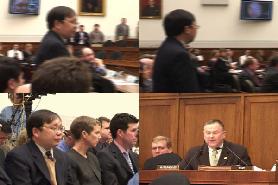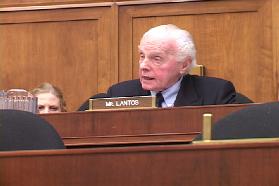On February 15, two House committees jointly held a hearing entitled, "The Internet in China: A Tool for Freedom or Suppression?" Four major U.S. technology companies, Google, Yahoo, Microsoft and Cisco received harsh questioning for yielding to pressure from the Chinese Communist regime. Atlanta practitioner Dr. Yuan Li, who was recently assaulted by the regime's secret agents, also attended the hearing.
When California democratic representative Dana Rohrabacher introduced Yuan Li, the audience responded with a standing ovation. Rohrabacher called Li "a hero who stood up for principles of freedom."

Practitioner Yuan Li at the hearing. He received a standing ovation as he was introduced.
More than 20 representatives of the House attended the hearing, which lasted more than 7 hours. C-Span broadcast the hearing live. The hearing received worldwide attention and all major media reported on it.
Li Yuan Received a Standing Ovation
Dr. Li made a special trip to attend the hearing. The wounds in his face were not completely healed. On February 8, Li, a Falun Gong practitioner, was assaulted by Chinese Communist regime's secret agents who brutally attacked Li in his own home and took away two laptop computers.
Looking at the U.S. administrative officials, Rohrabacher said that you have to make a choice between Dr. Yuan Li, who has stood up for freedom, and a totalitarian regime.

Practitioner Dr. Yuan Li was referred to as "A hero of freedom" by California representative Rohrabacher
Dr. Li received a standing ovation as he was introduced by Rohrabacher. Li stood up several times to thank the representatives and the general audience for their support. During the process, the live TV broadcast aired information on the assault and showed Li's injured face which required 15 stitches.
Four Internet Companies Under Fire at the Hearing
During the hearing, "The Internet in China: A Tool for Freedom or Suppression?", Google, Yahoo, Microsoft and Cisco testified in front of U.S. lawmakers.
After Yahoo provided information about Chinese journalist Shi Tao to the Chinese Communist regime, Shi Tao was sentenced last year to 10 years in prison for sending e-mails promoting democracy. Yahoo has been widely criticized since then. Yahoo's Michael Callahan said that Yahoo was regretful for the punishment of dissidents who wanted to express their opinion. However, he said that Yahoo had to comply with Chinese laws.
His explanation was questioned by Congressman Christopher Smith, chairman of the House International Relations Subcommittee on Africa, Global Human Rights and International Operations.
Smith asked, "If the secret police a half century ago asked where Anne Frank was hiding, would the correct answer be to hand over the information in order to comply with local laws? These are not victimless crimes. We must stand with the oppressed, not the oppressors."
Google has been widely criticized for filtering information related to Falun Gong, Tibet and other topics that are regarded as sensitive by Beijing. Elliot Schrage, Google's vice president of global communications and global affairs, acknowledged that the company had compromised to China, filtering some "politically sensitive" information. Schrage said that Google didn't want to see such a thing happen.
Representative Tom Lantos, chair of House International Relations, said that these companies were apparently lacking in social responsibility. "These captains of industry should have been developing new technologies to bypass the sickening censorship of government and repugnant barriers to the Internet. Instead, they enthusiastically volunteered for the Chinese censorship brigade."

Representative Tom Lantos, chairman of House International Relations
Lantos questioned representatives of these four companies. "Your abhorrent actions in China are a disgrace. I simply do not understand how your corporate leadership sleeps at night." This comment was widely cited by major U.S. media.
Representative Smith stated, "I believe that two of the most essential pillars that prop up totalitarian regimes are the secret police and propaganda. Yet for the sake of market share and profits, leading U.S. companies like Google, Yahoo, Cisco and Microsoft have compromised both the integrity of their products and their duties as responsible corporate citizens. They have aided and abetted the Chinese regime to prop up both of these pillars, propagating the message of the dictatorship unabated, and supporting the secret police in a myriad of ways, including surveillance and invasion of privacy, in order to effectuate the massive crackdown on its citizens. "

Vice-chair of House International Relations, Christopher Smith,
sponsored
the hearing
Smith questioned: "Should business enable the continuation of repressive dictatorships by partnering with a corrupt and cruel secret police and by cooperating with laws that violate basic human rights?"
Michael Callahan, a vice president and general counsel at Yahoo, said, "We are very distressed by the consequences of having to comply with Chinese laws."
Schrage, representative for Google, said that the company was not proud of or eager to filter its Chinese search engine. "We believe it will ultimately benefit our users in China," Schrage said.
Representative James Leach, Chairman of the Subcommittee on Asia & the Pacific, said, "What is interesting is that the censorship practices of American companies does not represent attempts to uphold the rhetoric of the Chinese Constitution. Rather, they are undertaken in response to - or in anticipation of - a threat of commercial or criminal reprisals by the Chinese government which contravene their own Constitution."
During the second round of the hearing, under questions from more than ten lawmakers, representatives of the four companies were often left speechless and in many occasions they didn't give direct answers to questions.
Some participants of the hearing were outraged by the despicable practice of the Chinese Communist regime. Such practice, forcing people and companies to compromise their dignity and social duties in exchange for commercial interests, has received wide criticism in the U.S.
Chinese Communist Regime Suppresses Dissidents
Smith said, "To date, an estimated 49 cyber-dissidents and 32 journalists have been imprisoned by the PRC for merely posting information on the Internet critical of the regime. And that's likely to be only the tip of the iceberg."
Representative Leach of Iowa said, "During the past year, the Chinese Communist Party has improved its ability to silence and control political discussion on the Internet."
Leached said that we must protect the basic function of the Internet to prevent it from becoming a functionary of the oppressive regime.
U.S. Government To Take Urgent Action
Representative Smith said, "Not surprisingly, Americans, not just Chinese, are also the victims of this censorship ... I believe our government also has a major role to play in this critical area, and that a more comprehensive framework is needed to protect and promote human rights. This is why I intend to introduce The Global Online Freedom Act of 2006 in the coming week to promote freedom of expression on the Internet."
Representative Jeff Fortenberry said that we should accept this kind of business after the hearing.
To close his opening remarks, Smith said, "I hope this hearing might be the beginning of a different sort of dialogue - a discussion on how American high-tech firms can partner with the U.S. government and human rights activists to bring down the Great Firewall of China, and on how America's greatest software engineers can use their intelligence to create innovative new products to protect dissidents and promote human rights."
Lantos said that to all unbiased bystanders, it is very clear that these companies will continue to collude with a totalitarian regime if Congress doesn't expose their abhorrent collusion. Representative Lantos stated that these Internet companies need to stand up to resist the pressure from China and any country where they do business. [paraphrased]
On February 10, 2006, Chinese and German staff from The Epoch Times newspaper came to the Chinese Embassy in Berlin to protest the violence of the Chinese Communist Party (CCP) and asked that the henchmen who had beaten up Falun Gong practitioner Dr. Li Yuan, an information technology specialist for The Epoch Times in Atlanta, USA, be brought to justice. At the same time, Ms. Zheng Zhihong, a Falun Gong practitioner from Berlin had been asked to come to the Embassy to "have a talk."
Before entering the Embassy, Ms. Zheng told the police officer on duty about her passport and the malevolent nature of the CCP and also gave him a copy of the Nine Commentaries on the Communist Party, a series of editorials published by the Epoch Times that exposes the history and atrocities of the CCP.
A week earlier, Ms. Zheng applied to have her passport extended and handed in her passport to the Embassy before its expiration date. Meanwhile, she had to register permanent residency for her five-month-old son as well. The staff of the Embassy accepted her application and told her that she could get her passport back the following Friday, February 10th. On Monday, Ms. Zheng got a call from the Embassy. The person on the phone asked whether Ms. Zheng practiced Falun Gong or not. When she answered, "Yes," she was told to come to the Embassy and "have a talk." When the Embassy staff asked if her husband practiced Falun Gong as well, Ms. Zheng refused to answer.
On February 10th, Zheng, along with a western Falun Gong practitioner, arrived at the Embassy where she had a talk with a staff member at the window for those applying for an extension of their passports. According to Ms. Zheng, the staff member told her, "You should have known what Falun Gong practitioners are doing in China." Zheng answered, "I do know what they are doing. They haven't done anything illegal but I know what the CCP is doing in China and how the CCP is persecuting Falun Gong as well." Ms. Zheng related that the staff member who talked with her looked nervous and seemed that he didn't want to go deeply into the matter.
Finally, the staff member of the Embassy refused to give the passport back to Ms. Zheng, with the excuse of not having it ready. Ms. Zheng asked them to explain why they at first told her that they would have her passport ready within a week but now told her that they didn't have it ready and still wanted to have a talk about Falun Gong with her. The staff member refused to give any explanation, but rather called in a German policeman and told him a lie that Ms. Zheng was distributing material about Falun Gong in the Embassy. When the policeman stated that Ms. Zheng didn't distribute any materials, he didn't pay any attention to the request to drive her away from the Embassy.
After leaving the Embassy, Ms. Zheng immediately participated in the protest against the violence of the CCP.

